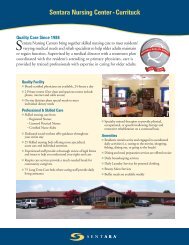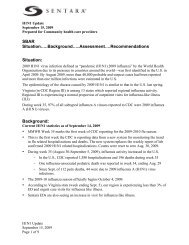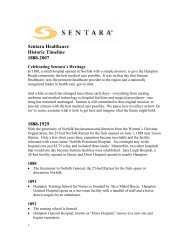2012 Annual Report - Sentara.com
2012 Annual Report - Sentara.com
2012 Annual Report - Sentara.com
Create successful ePaper yourself
Turn your PDF publications into a flip-book with our unique Google optimized e-Paper software.
Colorectal Cancer Program<br />
Team of Dedicated Specialists<br />
As part of the <strong>Sentara</strong> Cancer Network, the Colorectal<br />
Cancer Program offers a <strong>com</strong>prehensive network<br />
of dedicated specialists who meet regularly to<br />
collaborate and make re<strong>com</strong>mendations on patient<br />
treatment.<br />
At each hospital, patient cases are discussed at a<br />
very high, multi-disciplinary level with many different<br />
opinions put into the equation. All the slides and<br />
x-rays are reviewed, along with details of the patient’s<br />
history, and a consensus is determined followed by<br />
the development of a specific care plan.<br />
Collaboration for Quality Improvement<br />
The number one ac<strong>com</strong>plishment of the colorectal<br />
program this year is the reflective pathology testing<br />
(Immunohistochemical stains for mismatch repair<br />
proteins) of all colorectal specimens to identify<br />
those patients that need genetic testing for Lynch<br />
Syndrome. This testing was implemented in all<br />
Hampton Roads hospitals in July. This change will<br />
increase the ability to identify patients with high risk<br />
factors that need additional testing to determine the<br />
best long term treatment planning for them and their<br />
immediate family members.<br />
The Colorectal Cancer Program also launched<br />
a project to reduce surgical site infections related<br />
to cancer and non-cancer colorectal surgery. By<br />
improving the <strong>com</strong>munication process between<br />
the circulator and the surgeon, the accurate<br />
identification of wound class can be correctly<br />
benchmarked for national statistics.<br />
Figure 3.<br />
Observed Survival for Colorectal Cases -<br />
Figure 4.<br />
Observed Survival for Colorectal Cases -<br />
<strong>Sentara</strong> Cancer Network 2003 - 2005<br />
National Cancer Data Base for 2003 - 2005<br />
The graphs below are a <strong>com</strong>parison between the 5-year survival for colon cancer in the National Cancer Data Base 2003-2005 and the 5-year<br />
survival for the <strong>Sentara</strong> Cancer Network 2003-2005. Stage I, II, and IV are lower in <strong>Sentara</strong> than at the NCDB. Stage 0 and III are slightly higher<br />
than the National Cancer Data Base.<br />
Cumulative Survival Rate<br />
100%<br />
90%<br />
80%<br />
70%<br />
60%<br />
50%<br />
40%<br />
30%<br />
20%<br />
10%<br />
0%<br />
Dx 1 Year 2 Years 3 Years 4 Years<br />
Years from Diagnosis<br />
Cumulative Survival Rate<br />
100%<br />
90%<br />
80%<br />
70%<br />
60%<br />
50%<br />
40%<br />
30%<br />
20%<br />
10%<br />
0%<br />
5 Years Dx 1 Year 2 Years 3 Years 4 Years 5 Years<br />
Years from Diagnosis<br />
Stage O n = 47 Stage I n = 218 Stage II n = 195<br />
Stage III n = 196 Stage IV n = 159<br />
Stage O n = 17,262 Stage I n = 52,216 Stage II n = 57,012<br />
Stage III n = 57,458 Stage IV n = 44,462<br />
www.sentara.<strong>com</strong>/cancer 7

















